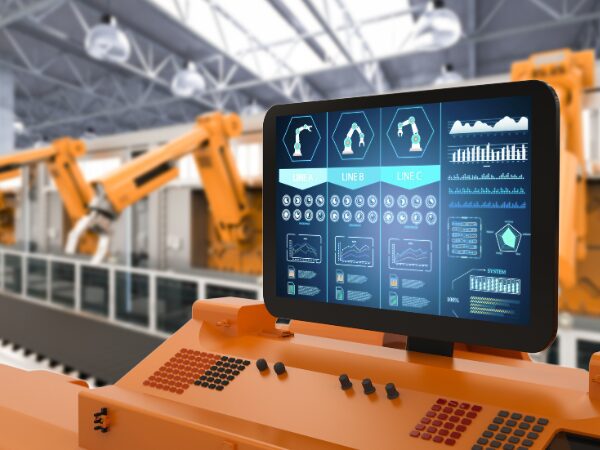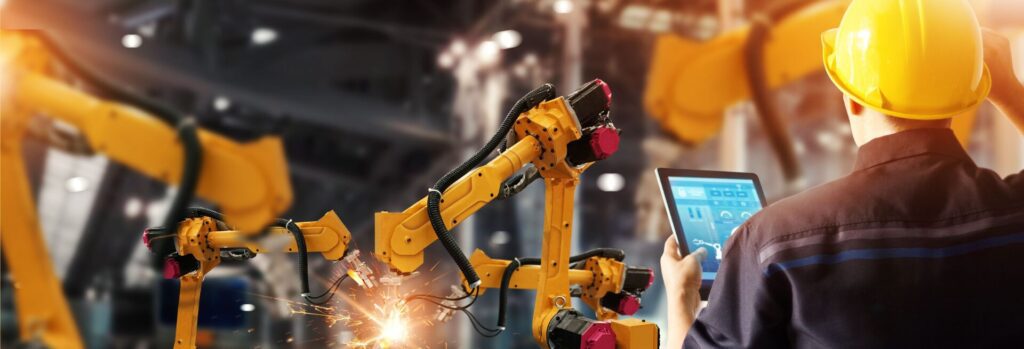Industry 4.0: Digital Transformation in Manufacturing
The Industry 4.0 represents a blend of two industries: information technology and manufacturing. ...

Across a variety of industries, AI-powered automations (Artificial Intelligence) are profoundly changing business operations. Recent studies have demonstrated that approximately 44% of organizations have a significant interest in making substantial investments in artificial intelligence (AI). This article examines the significant effects of AI-powered automations on various sectors, companies, and industries. Therefore, we will explore the four most revolutionized sectors by this technology, as well as the advancements and challenges that can accompany this novel technology.
Artificial intelligence (AI)-enabled robots and machines play a crucial role in optimizing production processes across numerous industries. The capacity to conduct real-time data analysis, make informed decisions, and execute tasks with a high level of accuracy is significantly transforming the manufacturing industry. Researchers at the Future of Humanity Institute at Oxford University have found through their AI survey, “When Will AI Exceed Human Performance?” that most respondents expect machines to write school essays by 2026, self-driving trucks to replace drivers by 2027, and humans to outperform humans in retail positions by 2031. By 2030, the global economy could gain up to $15.7 trillion by utilizing artificial intelligence. The use of artificial intelligence (AI) in the manufacturing sector encompasses automation and the development of intelligent, flexible, and sustainable production systems. This trend will continue and evolve as artificial intelligence (AI) technologies progress and become increasingly useful in all industries.
In the healthcare sector, AI has already brought outstanding advantages and transformed traditional processes. Artificial intelligence (AI) has the potential to enhance the accuracy and precision of illness detection. With the innovative models that have been developed, we are able to automate processes for treatments and medical procedures. The efficiency and expansion of the algorithms have even involved the automation of certain surgeries. Furthermore, it facilitated the cure process and the discovery of new treatments like enhanced drugs. This is achieved while ensuring the safety of patients, the confidentiality of their personal information, and reducing costs.
However, concerns have been raised about the efficiency of integrating artificial intelligence (AI) in all domains of healthcare. This is because human emotions are still a feature medical robots cannot fully emulate yet. The autonomous (robotic) systems lack human attributes, which constitute a crucial component in the medical field and in human interactions overall. Furthermore, patients will always favor “machine-human” medical relationships over “human-human” interactions. This emanates from the empathetic and compassionate environment that is provided by the professional staff in parallel with the treatment, which significantly affects the healing process of patients. As this cannot be achieved for the time being with robotic physicians and nurses, experts must not neglect the constant necessity for human involvement in this field.
AI use in healthcare has the potential to improve the performance of treatments and cures, mitigate costs, and enhance operational efficiency. As AI technologies continue to evolve and expand into healthcare systems, it’s crucial to address ethical, regulatory, and educational challenges to fully and ethically benefit from this technology.

Artificial intelligence (AI) has also made a major impact in the fields of finance and investment. It has fundamentally upgraded the strategies historically adopted by financial institutions to operate, manage risk, and make investment decisions. Specifically, it helps with analysis, prediction, forecasting, and real-time monitoring of all available financial data. It also has the ability to accurately, efficiently, and rapidly process valuable information and generate efficient and relevant information for financial services and organizations.
Many techniques are used in the finance and investing domains, such as speech recognition, sentiment analysis, anomaly detection, recommendations, translation, document processing, generative AI, cybersecurity, predictive modeling, data science analytics, and image recognition. For instance, artificial intelligence (AI) has the potential to assist payment platforms in predicting the probability of credit card transactions being approved or rejected using data science analytics.
Nevertheless, as for the medical field and other domains, the use of AI in finance and investment has also brought some ethical and regulatory challenges. Indeed, it raises concerns about algorithmic bias, transparency, and accountability. Regulatory institutions are actively engaged in establishing guidelines to ensure fair and ethical AI use. The process of developing an ethical decision framework for AI-driven investment processes is complex. The current aim is to ensure applications serve the best interests of clients. As the use of AI in investment management is still in its early stages, it is imperative to start immediately treating concerns and implementing platforms, applications, and regulations to responsibly guide future advancements.
AI, when used correctly, can create personalized learning experiences, which can overcome the challenges faced by disengaged students and enhance the effectiveness of conventional, non-customized educational approaches.
Recently, the University of Murcia in Spain began testing an AI-enabled chatbot to answer students’ questions about the campus and areas of study. The model was able to answer more than 38,708 questions, with an accuracy rate of over 91%. Research has also demonstrated that the chatbot had a positive impact on student motivation. All these benefits were achieved without making any alterations to the university’s structure, equipment, or personnel.
While algorithms can provide valuable guidance in decision-making processes, it is not advisable to only rely on robots and algorithms for all instructional tasks. Utilizing the assistance of AI algorithms is crucial in order to facilitate the establishment of optimal learning environments.
AI-powered automation is rapidly reshaping industries, offering a range of opportunities and challenges. This article emphasizes the necessity for businesses and society to adjust to this revolutionary technology and its potential to create a more efficient, innovative, and equitable future.
Companies that are innovating in this sector are likely to be eligible for several funding programs including government grants, and SR&ED.
Want to learn about funding opportunities for your project? Schedule a free consultation with one of our experts today!
Sources :
How AI And Automation Are Transforming The World (forbes.com)
Ethical Issues of Artificial Intelligence in Medicine and Healthcare – PMC (nih.gov)
How AI and Data Could Personalize Higher Education (hbr.org)
Explore our latest insights
More arrow_forward
The Industry 4.0 represents a blend of two industries: information technology and manufacturing. ...

Provincial governments are slowly unveiling their provincial budgets outlining fiscal strategies ...

Recently, Canadian representatives attended COP27 to discuss the actionable steps to implement to...

Human-Machine Collaboration has become an essential part of the manufacturing industry. This coll...